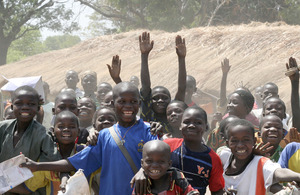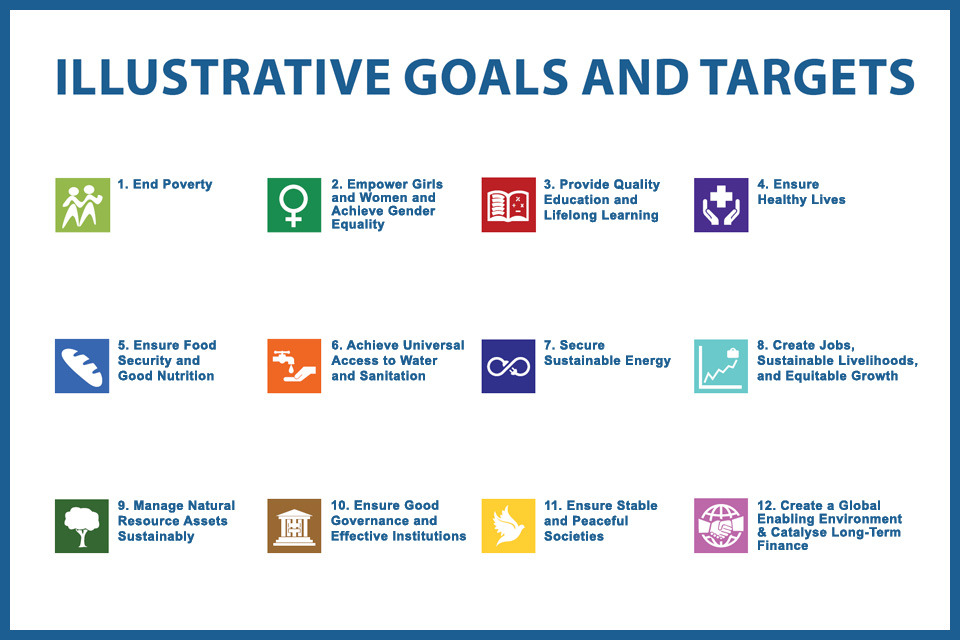We can end global poverty by 2030 – United Nations report
A panel co-chaired by the Prime Minister has set out an ambitious plan to eradicate poverty after the Millennium Development Goals expire in 2015

The report says no-one should be left behind in the drive to end poverty. Picture: Simon Davis/DFID
An international panel, co-chaired by David Cameron, has told the United Nations that the world can – and must – end extreme poverty by 2030.
The High Level Panel on the Post 2015 Development Agenda, who were tasked with looking at the best ways to reduce global poverty by UN Secretary General Ban Ki-moon, presented its recommendations today.
In its report, titled ‘A New Global Partnership: Eradicate Poverty and Transform Economies through Sustainable Development’, the panel proposes 12 measurable goals and 54 targets for the international community to rally around to take action.
Infographic: The 12 goals to end poverty. View the full-size version

Image of the 12 goals proposed by the UN panel
Prime Minister David Cameron said:
This report sets out a clear roadmap for eradicating extreme poverty by 2030.
We need a new global partnership, to finish the job on the current Millennium Development Goals, tackle the underlying causes of poverty, and champion sustainable development.
The overarching goals include ending extreme poverty for good, making sure everyone has access to food and water, promoting good government and boosting jobs and growth.
The individual targets include promoting free speech and the rule of law, ending child marriage, protecting property rights, encouraging entrepreneurship and educating all children to at least primary school level.
The goals the report put forward are based on 5 big ideas:
-
finish the job: the Millennium Development Goals aimed to halve poverty – these new goals will end it by 2030
-
go green: for decades, the ‘green’ and development agendas have been separate. This report says they should be brought together
-
go for growth: economic growth is the only exit from poverty. A greater focus is needed on jobs, business and economic opportunity for all
-
good government: the need for free speech, good government, and tackling corruption has been avoided in the development debate. The panel put building the institutions of an open society at the heart of its approach, as well as ending conflict and violence
-
global partnership: everyone around the world must work together to make it happen
The final report comes after 8 months of consultation with more than 5,000 public groups across 120 different countries. Citizens, governments, businesses, local charities, community groups and development experts all had a chance to contribute their ideas.
The process began last year when the Prime Minister, alongside Presidents Yudhoyono of Indonesia and Johnson Sirleaf of Liberia, was asked by Ban Ki-moon to set out ideas for a new set of development goals that could replace the existing Millennium Development Goals.
They led a 27-strong team of global leaders – officially called the High Level Panel on the Post 2015 Development Agenda (HLP) – who met in London (UK), Monrovia (Liberia) and Bali (Indonesia) to discuss the next steps forward.
The panel’s work is now complete, but its report will now be used to kick-start 2 years of discussion and negotiation to set the development agenda that will succeed the current Millennium Development Goals when they expire in 2015.
Related government links
- Infographic: The 12 goals to end poverty
- Statement: Development Secretary Justine Greening’s update on the report to the Houses of Parliament
- News story: Beyond 2015 - Follow the discussions shaping the post 2015 development agenda
- News story: Prime Minister to co-chair UN panel on development
More around the web
- The report: A New Global Partnership: Eradicate Poverty and Transform Economies through Sustainable Development
- The High Level Panel on the Post 2015 Development Agenda
- The Millennium Development Goals (MDGs)
- BBC News: UN urged to embrace 2030 goal on ending extreme poverty
- The Economist: Poverty - Not always with us
- Global Dashboard: After 2015 - The High Level Panel reports